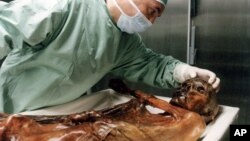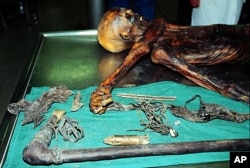Scientists have uncovered the last meal of a hunter who froze to death 5,300 years ago in the mountains of Europe.
Researchers said the discovery inside the stomach of a corpse, known as Oetzi the Iceman, showed what Europeans ate at the time.
Shortly before his death, they said, the Iceman ate the fat and meat of a wild goat, meat from a red deer and whole wheat seeds. They reported the findings Thursday in the journal Current Biology.
Researchers also found some fern leaves and seeds. They think he could have eaten the plant by mistake or used it as medicine.
Frank Maixner is a scientist at the Institute for Mummy Studies in Bolzano, Italy. He called the discovery “impressive.” He said, “We could see chunks and pieces of food with (the) naked eye.”
Though researchers had previously examined Oetzi’s body, this was the first time they could look into his stomach.
Why did they wait so long?
Scientists did not find the Iceman’s stomach until 2009, 18 years after his body was discovered in the Alps near the Italy-Austria border.
A radiologist found his stomach hidden behind the rib cage. And it was full. After slowly defrosting the body, the team took samples and rehydrated them.
Nearly half the stomach contains body fat of an ibex, a kind of wild goat that still lives in the Alps.
Maixner observed that the Iceman and hunters from thousands of years ago had to be prepared. Maixner, who has climbed to the cold and windy site where Oetzi was found, said, “They had to have food that gave them the necessary energy (to survive).”
A scientist from the University of Oslo, Albina Hulda Palsdottir, believes the findings are very valuable.
She said, “They’re trying to use all the methods in the toolbox to answer this really important question of what people were really eating” back then.
I’m Anna Matteo.
Hai Do adapted this story for Learning English based on a report from the Associated Press. Kelly Jean Kelly was the editor.
Write to us in the Comments Section or on our Facebook page.
______________________________________________________________
Words in This Story
wheat - n. a kind of grain
impressive - adj. deserving attention, admiration, or respect
chunks - n. thick pieces of something
rehydrate - v. add water or moisture






